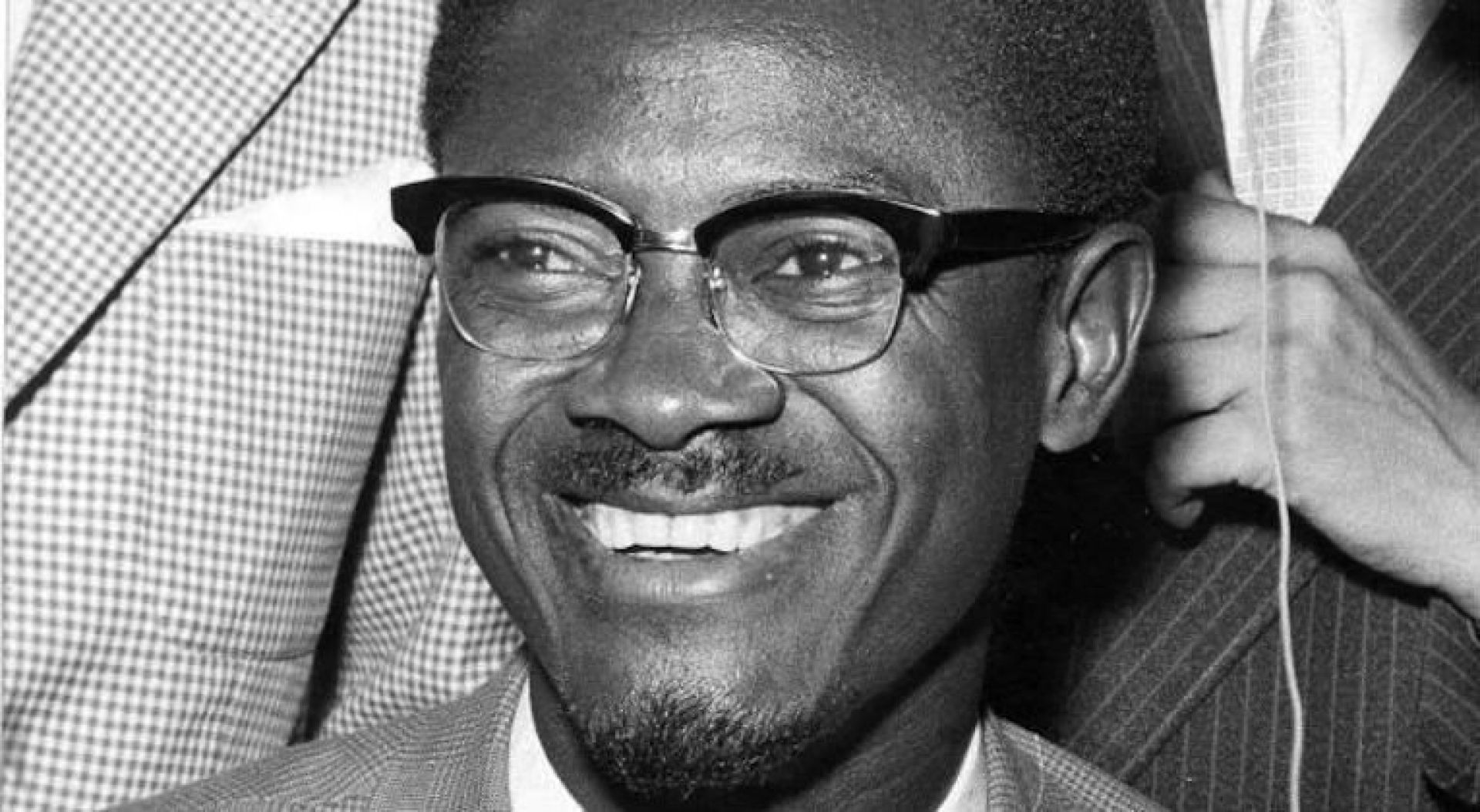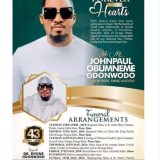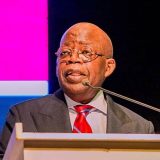Patrice Lumumba was born on 2 July 1925 to a farmer, François Tolenga Otetshima, and his wife Julienne Wamato Lomendja, in Onalua in the Katakokombe region of the Kasai province of the Belgian Congo. He was a member of the Tetela ethnic group and was born with the name Élias Okit’Asombo. His original surname means “heir of the cursed” and is derived from the Tetela words okitá/okitɔ́ (‘heir, successor’) and asombó (‘cursed or bewitched people who will die quickly’).
He had three brothers (Charles Lokolonga, Émile Kalema, and Louis Onema Pene Lumumba) and one half-brother (Tolenga Jean). Raised in a Catholic family, he was educated at a Protestant primary school, a Catholic missionary school, and finally the government post office training school, where he passed the one-year course with distinction. Lumumba spoke Tetela, French, Lingala, Swahili, and Tshiluba.
Outside of his regular studies, Lumumba took an interest in the Enlightenment ideals of Jean-Jacques Rousseau and Voltaire. He was also fond of Molière and Victor Hugo. He wrote poetry, and many of his works had an anti-imperialist theme.
He worked as a traveling beer salesman in Léopoldville and as a postal clerk in a Stanleyville Post Office for eleven years. In 1951, he married Pauline Opangu.
In the period following World War II, young leaders across Africa increasingly worked for national goals and independence from the colonial powers. In 1955, Lumumba became regional head of the Cercles of Stanleyville and joined the Liberal Party of Belgium.
He edited and distributed party literature. After a study tour in Belgium in 1956, he was arrested on charges of embezzlement of $2500 from the post office. He was convicted and sentenced one year later to twelve months imprisonment and a fine.
After his release, Lumumba helped found the Mouvement National Congolais (MNC) party on 5 October 1958, and quickly became the organization’s leader.
The MNC, unlike other Congolese parties developing at the time, did not draw on a particular ethnic base. It promoted a platform that included independence, gradual Africanisation of the government, state-led economic development, and neutrality in foreign affairs. Lumumba had a large popular following, due to his personal charisma, excellent oratory, and ideological sophistication. As a result, he had more political autonomy than contemporaries who were more dependent on Belgian connections.
Lumumba was one of the delegates who represented the MNC at the All-African Peoples’ Conference in Accra, Ghana, in December 1958. At this international conference, hosted by Ghanaian President Kwame Nkrumah, Lumumba further solidified his Pan-Africanist beliefs. Nkrumah was personally impressed by Lumumba’s intelligence and ability.
In late October 1959, Lumumba, as leader of the MNC, was arrested for inciting an anti-colonial riot in Stanleyville; 30 people were killed. He was sentenced to 69 months in prison. The trial’s start date of 18 January 1960 was the first day of the Congolese Round Table Conference in Brussels, intended to make a plan for the future of the Congo.
Despite Lumumba’s imprisonment, the MNC won a convincing majority in the December local elections in the Congo. As a result of strong pressure from delegates upset by Lumumba’s trial, he was released and allowed to attend the Brussels conference.
The conference culminated on 27 January with a declaration of Congolese independence. It set 30 June 1960 as the independence date with national elections to be held from 11–25 May 1960. The MNC won a plurality in the election.
Six weeks before the date of independence, Walter Ganshof van der Meersch was appointed as the Belgian Minister of African Affairs. He lived in Léopoldville, in effect becoming Belgium’s de facto resident minister in the Congo, administering it jointly with Governor-general Hendrik Cornelis.[16] He was charged with advising Baudouin on the selection of a formateur. On 8 June Ganshof flew to Brussels to meet with Baudouin. He made three suggestions for formateur: Lumumba, as the winner of the elections; Kasa-Vubu, the only figure with a reliable national reputation who was associated with the coalescing opposition; or some to-be-determined third individual who could unite the competing blocs.
Ganshof returned to the Congo on 12 June. The following day he appointed Lumumba to serve as the delegate (informateur) tasked with investigating the possibility of forming a national unity government that included politicians with a wide range of views, with 16 June as his deadline. The same day as Lumumba’s appointment, the parliamentary opposition coalition, the Cartel d’Union Nationale, was announced. Though Kasa-Vubu was aligned with their beliefs, he remained distanced from them. The MNC-L was also having trouble securing the allegiances of the PSA, CEREA, and BALUBAKAT. Initially, Lumumba was unable to establish contact with members of the cartel. Eventually several leaders were appointed to meet with him, but their positions remained entrenched. On 16 June Lumumba reported his difficulties to Ganshof, who extended the deadline and promised to act as an intermediary between the MNC leader and the opposition. Once Ganshof had made contact with the cartel leadership, he was impressed by their obstinacy and assurances of a strong anti-Lumumba polity. By evening Lumumba’s mission was showing even less chances of succeeding. Ganshof considered extending the role of informateur to Adoula and Kasa-Vubu, but faced increasing pressure from Belgian and moderate Congolese advisers to end Lumumba’s assignment.
The following day Ganshof declared that Lumumba had failed and terminated his mission. Acting on Ganshof’s advice, Baudouin then named Kasa-Vubu formateur. Lumumba responded by threatening to form his own government and present it to Parliament without official approval. He called a meeting at the OK Bar in Léopoldville, where he announced the creation of a “popular” government with the support of Pierre Mulele of the PSA.
Meanwhile, Kasa-Vubu, like Lumumba, was unable to communicate with his political opponents. He assumed that he would secure the Presidency, so he began looking for someone to serve as his prime minister. Most of the candidates he considered were friends who had foreign support similar to his own, including Kalonji, Iléo, Cyrille Adoula, and Justin Bomboko. Kasa-Vubu, was slow to come to a final decision.
On 18 June Kasa-Vubu announced that he had completed his government with all parties except the MNC-L. That afternoon Sendwe, Gizenga, and Kashamura announced in the presence of Lumumba that their respective parties were not committed to the government. The next day Ganshof summoned Kasa-Vubu and Lumumba to a meeting so they could forge a compromise. This failed when Lumumba flatly refused the position of prime minister in a Kasa-Vubu government. The following day the two rivals met in the presence of Adoula and diplomats from Israel and Ghana, but no agreement was reached.
Most party leaders refused to support a government that did not include Lumumba. The decision to make Kasa-Vubu the formateur was a catalyst that rallied the PSA, CEREA, and BALUBAKAT to Lumumba, making it unlikely that Kasa-Vubu could form a government that would survive a vote of confidence. When the Chamber met on 21 June to select its officers, Joseph Kasongo of the MNC-L was elected president with 74 votes (a majority), while the two vice presidencies were secured by the PSA and CEREA candidates, both of whom had the support of Lumumba. With time running out before independence, Baudouin took new advice from Ganshof and appointed Lumumba as formateur.
Once it was apparent that Lumumba’s bloc controlled Parliament, several members of the opposition became eager to negotiate for a coalition government in order to share power. By 22 June Lumumba had a government list, but negotiations continued with Bolikango, Albert Delvaux, and Kasa-Vubu. Lumumba reportedly offered ABAKO the ministerial positions for Foreign Affairs and Middle Classes, but Kasa-Vubu instead demanded the Ministry of Finance, a minister of state, the Secretary of State for the Interior, and a written pledge of support from the MNC-L and its allies for his presidential candidacy. Kalonji was presented with the agriculture portfolio by Lumumba, which he rejected, although he was suitable due to his experience as an agricultural engineer. Adoula was also offered a ministerial position, but refused to accept it.
By the morning of 23 June, the government was, in the words of Lumumba, “practically formed”. At noon, he made a counter-offer to Kasa-Vubu, who instead responded with a letter demanding the creation of a seventh province for the Bakongo. Lumumba refused to comply and instead pledged to support Jean Bolikango in his bid for the Presidency. At 14:45 he presented his proposed government before the press. Neither ABAKO nor the MNC-K were represented among the ministers, and the only PSA members were from Gizenga’s wing of the party.
The Bakongo of Léopoldville were deeply upset by their exclusion from Lumumba’s cabinet. They subsequently demanded the removal of the PSA-dominated provincial government and called for a general strike to begin the following morning. At 16:00 Lumumba and Kasa-Vubu resumed negotiations. Kasa-Vubu eventually agreed to Lumumba’s earlier offer, though Lumumba informed him that he could not give him a guarantee of support in his presidential candidacy.
The resulting 37-strong Lumumba Government was very diverse, with its members coming from different classes, different tribes, and holding varied political beliefs. Though many had questionable loyalty to Lumumba, most did not openly contradict him out of political considerations or fear of reprisal.
At 22:40 on 23 June, the Chamber of Deputies convened in the Palais de la Nation to vote on Lumumba’s government. After Kasongo opened the session, Lumumba delivered his main speech, promising to maintain national unity, abide by the will of the people, and pursue a neutralist foreign policy.
It was warmly received by most deputies and observers. The Chamber proceeded to engage in a heated debate. Though the government contained members from parties that held 120 of the 137 seats, reaching a majority was not a straightforward task. While several leaders of the opposition had been involved in the formative negotiations, their parties as a whole had not been consulted.
Furthermore, some individuals were upset they had not been included in the government and sought to personally prevent its investiture.In the subsequent arguments, multiple deputies expressed dissatisfaction at the lack of representation of their respective provinces and/or parties, with several threatening secession. Among them was Kalonji, who said he would encourage people of Kasaï to refrain from participating in the central government and form their own autonomous state. One Katangese deputy objected to the same person being appointed as premier and as head of the defence portfolio.
When a vote was finally taken, only 80 of the 137 members of the Chamber were present. Of these, 74 voted in favor of the government, five against, and one abstained. The 57 absences were almost all voluntary. Though the government had earned just as many votes as when Kasongo won the presidency of the Chamber, the support was not congruent; members of Kamitatu’s wing of the PSA had voted against the government while a few members of the PNP, PUNA, and ABAKO voted in favor of it. Overall, the vote was a disappointment for the MNC-L coalition. The session was adjourned at 02:05 on 24 June.
The Senate convened that day to vote on the government. There was another heated debate, in which Iléo and Adoula expressed their strong dissatisfaction with its composition.
CONAKAT members abstained from voting. When arguments concluded, a decisive vote of approval was taken on the government: 60 voted in favor, 12 against, while eight abstained. All dissident arguments for alternative cabinets, particularly Kalonji’s demand for a new administration, were rendered impotent, and the Lumumba Government was officially invested. With the institution of a broad coalition, the parliamentary opposition was officially reduced to only the MNC-K and some individuals.
At the onset of his premiership, Lumumba had two main goals: to ensure that independence would bring a legitimate improvement in the quality of life for the Congolese and to unify the country as a centralised state by eliminating tribalism and regionalism. He was worried that opposition to his government would appear rapidly and had to be managed quickly and decisively.
To achieve the first aim, Lumumba believed that a comprehensive “Africanisation” of the administration, in spite of its risks, would be necessary. The Belgians were opposed to such an idea, as it would create inefficiency in the Congo’s bureaucracy and lead to a mass exodus of unemployed civil servants to Belgium, whom they would be unable to absorb into the government there. It was too late for Lumumba to enact Africanisation before independence. Seeking another gesture that might excite the Congolese people, Lumumba proposed to the Belgian government a reduction in sentences for all prisoners and an amnesty for those serving a term of three years or less. Ganshof feared that such an action would jeopardize law and order, and he evaded taking any action until it was too late to fulfill the request. Lumumba’s opinion of the Belgians was soured by this affair, which contributed to his fear that independence would not appear “real” to the average Congolese.
In seeking to eliminate tribalism and regionalism in the Congo, Lumumba was deeply inspired by the personality and undertakings of Kwame Nkrumah and by Ghanaian ideas of the leadership necessary in post-colonial Africa. He worked to seek such changes through the MNC. Lumumba intended to combine it with its parliamentary allies—CEREA, the PSA, and possibly BALUBAKAT—to form one national party, and to build a following in each province. He hoped it would absorb other parties and become a unifying force for the country.
Independence Day was celebrated on 30 June in a ceremony attended by many dignitaries, including King Baudouin of Belgium and the foreign press. Baudouin’s speech praised developments under colonialism, his reference to the “genius” of his great-granduncle Leopold II of Belgium, glossing over atrocities committed during his reign over the Congo Free State. Belgian prime minister Gaston Eyskens, who checked the text, thought this passage went too far. He wanted to drop this reference to Léopold II. The King had limited political power in Belgium, but he was free to write his own speeches (after revision by the government).
The King continued, “Don’t compromise the future with hasty reforms, and don’t replace the structures that Belgium hands over to you until you are sure you can do better. Don’t be afraid to come to us. We will remain by your side, give you advice.” President Kasa-Vubu thanked the King.
Lumumba, who had not been scheduled to speak, delivered an impromptu speech that reminded the audience that the independence of the Congo had not been granted magnanimously by Belgium:
For this independence of the Congo, although being proclaimed today by agreement with Belgium, an amicable country, with which we are on equal terms, no Congolese worthy of the name will ever be able to forget that it was by fighting that it has been won, a day-to-day fight, an ardent and idealistic fight, a fight in which we were spared neither privation nor suffering, and for which we gave our strength and our blood. We are proud of this struggle, of tears, of fire, and of blood, to the depths of our being, for it was a noble and just struggle, and indispensable to put an end to the humiliating slavery which was imposed upon us by force.
Most European journalists were shocked by the stridency of Lumumba’s speech.
The Western media criticised him. Time magazine characterized his speech as a ‘venomous attack’. In the West, many feared that the speech was a call to arms that would revive Belgian-Congolese hostilities, and plunge the former Belgian colony into chaos.







